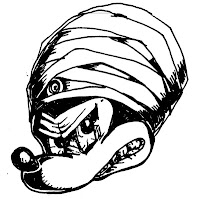The addressee above links to a short documentary by and about the Danish composer Parl Kristian Bjørn Vester, who is better known by his stage name Goodiepal. The documentary deals with Goodiepals so called War for radical computer music, which is a series of works of performance-art and a conceptual record release. The record release, which I will discuss later in this essay, is the project I find the most interesting, but the video is also worth watching because it portrays Goodiepal, who is quite a character, and presents some of his eccentric and original ideals. The video is also fascinating because, or maybe in spite of, it gives and insight into the visual and audiotive anti-aesthetics[2] pursued by Goodiepal and his affiliates.
In order to discuss the critical / subversive potential of the record release at, I will briefly retell the events which serve as its context. Goodiepal was teaching as a professor at the Royal Danish Academy for Electro-Acoustic Music (DIEM). He taught his bizarre ideas about utopia, time travel, the development of a European robot-mythology, non-linear compositisions and last but not least the concept of Radical computer music (which is not music made with computers and digital instruments, but music made for the pleasure artificial intelligences of the future).
In 2008 Goodiepal was dismissed from DIEM, because the headmaster and schools governing body became aware of the untraditional subjects taught in Goodiepals classes. Goodiepal was apparently stricken with a thirst for vengeance and staged a war against the academy. His first offensive move was to team up with two crooked musicians and steal a very expensive effect-machine from DIEM. The effect-machine was then hacked and modified, and later sold to a Belgian collector, to partly finance the record release mentioned earlier.
The most astonishing about this 45€ vinyl record release was not the 13 hours of experiential music, but the fact that every LP sold had an genuine 500 kroner (70€) bill enclosed: You earned money when buying it! I find this concept amazing because it distorts our conceptions of economic necessity, ignoring the primary principals of capitalism. It has its critical potential in contrast to the dominant political discourse on art (and the humanities), where art is supposed to function and develop under the principals of the market, and to be evaluated by its direct or indirect contribution to the GDP.
An alternative attempt to deal whit these conditions of the arts are currently being made by the Danish Association of Musicians. They have established a research project which is to prove how and to what extent state subsidy of art yields economic growth. In contrast to this, Goodiepal does not accept the premises. He insists that the artist is not the Rational man, that the potential of art is not the generating of profit.
The actual financing of this rather spectacular record release[3], is another strange aspect of the project, and raises a series of questions, which I unfortunately do not have the space to discuses in this essay. But if this has caught your interest, I can reveal that the story is being told in the video linked to above.
---
[1] Before watching the video, I will warn you that Goodiepal and SYGNOK uses the swastika-symbol provocatively, but are in fact declared anti-fascists.
[2]Their dismissal of harmony and beauty (both thematic and artistic) closely resembles that of the French picture book printing- and publishing house Le Dernier Cri.
[3] The record was issued in 1000 copies. The total cost of the release was therefore 500.000 dkk (67.000€) plus the production costs of the vinyl and cover.






